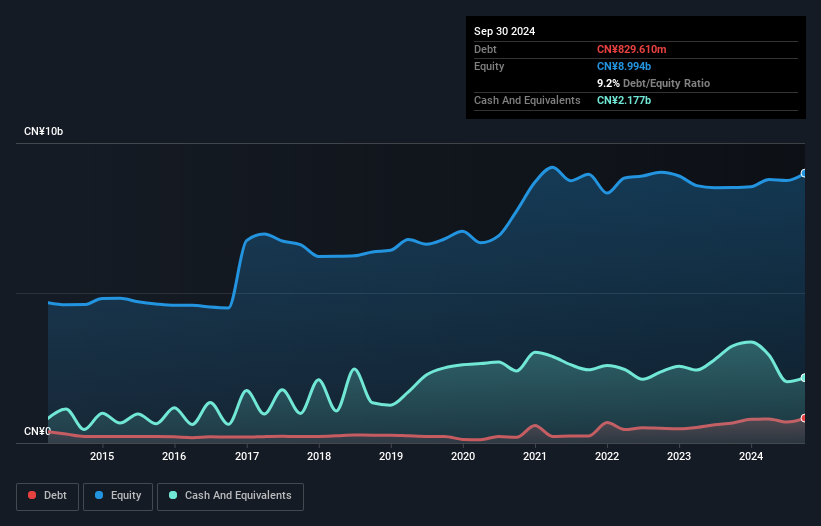Some say volatility, rather than debt, is the best way to think about risk as an investor, but Warren Buffett famously said that 'Volatility is far from synonymous with risk.' So it seems the smart money knows that debt - which is usually involved in bankruptcies - is a very important factor, when you assess how risky a company is. Importantly, Hangzhou Turbine Power Group Co., Ltd. (SZSE:200771) does carry debt. But the more important question is: how much risk is that debt creating?
When Is Debt A Problem?
Debt is a tool to help businesses grow, but if a business is incapable of paying off its lenders, then it exists at their mercy. Part and parcel of capitalism is the process of 'creative destruction' where failed businesses are mercilessly liquidated by their bankers. However, a more common (but still painful) scenario is that it has to raise new equity capital at a low price, thus permanently diluting shareholders. By replacing dilution, though, debt can be an extremely good tool for businesses that need capital to invest in growth at high rates of return. When we examine debt levels, we first consider both cash and debt levels, together.
Check out our latest analysis for Hangzhou Turbine Power Group
What Is Hangzhou Turbine Power Group's Debt?
The image below, which you can click on for greater detail, shows that at September 2024 Hangzhou Turbine Power Group had debt of CN¥829.6m, up from CN¥667.8m in one year. However, it does have CN¥2.18b in cash offsetting this, leading to net cash of CN¥1.35b.

A Look At Hangzhou Turbine Power Group's Liabilities
Zooming in on the latest balance sheet data, we can see that Hangzhou Turbine Power Group had liabilities of CN¥6.24b due within 12 months and liabilities of CN¥1.85b due beyond that. Offsetting this, it had CN¥2.18b in cash and CN¥4.21b in receivables that were due within 12 months. So its liabilities total CN¥1.71b more than the combination of its cash and short-term receivables.
Given Hangzhou Turbine Power Group has a market capitalization of CN¥10.8b, it's hard to believe these liabilities pose much threat. Having said that, it's clear that we should continue to monitor its balance sheet, lest it change for the worse. Despite its noteworthy liabilities, Hangzhou Turbine Power Group boasts net cash, so it's fair to say it does not have a heavy debt load!
Another good sign is that Hangzhou Turbine Power Group has been able to increase its EBIT by 28% in twelve months, making it easier to pay down debt. There's no doubt that we learn most about debt from the balance sheet. But it is Hangzhou Turbine Power Group's earnings that will influence how the balance sheet holds up in the future. So when considering debt, it's definitely worth looking at the earnings trend. Click here for an interactive snapshot.
Finally, a company can only pay off debt with cold hard cash, not accounting profits. Hangzhou Turbine Power Group may have net cash on the balance sheet, but it is still interesting to look at how well the business converts its earnings before interest and tax (EBIT) to free cash flow, because that will influence both its need for, and its capacity to manage debt. Over the last three years, Hangzhou Turbine Power Group recorded negative free cash flow, in total. Debt is usually more expensive, and almost always more risky in the hands of a company with negative free cash flow. Shareholders ought to hope for an improvement.
Summing Up
While Hangzhou Turbine Power Group does have more liabilities than liquid assets, it also has net cash of CN¥1.35b. And we liked the look of last year's 28% year-on-year EBIT growth. So we are not troubled with Hangzhou Turbine Power Group's debt use. When analysing debt levels, the balance sheet is the obvious place to start. However, not all investment risk resides within the balance sheet - far from it. Be aware that Hangzhou Turbine Power Group is showing 1 warning sign in our investment analysis , you should know about...
If, after all that, you're more interested in a fast growing company with a rock-solid balance sheet, then check out our list of net cash growth stocks without delay.
Valuation is complex, but we're here to simplify it.
Discover if Hangzhou Turbine Power Group might be undervalued or overvalued with our detailed analysis, featuring fair value estimates, potential risks, dividends, insider trades, and its financial condition.
Access Free AnalysisHave feedback on this article? Concerned about the content? Get in touch with us directly. Alternatively, email editorial-team (at) simplywallst.com.
This article by Simply Wall St is general in nature. We provide commentary based on historical data and analyst forecasts only using an unbiased methodology and our articles are not intended to be financial advice. It does not constitute a recommendation to buy or sell any stock, and does not take account of your objectives, or your financial situation. We aim to bring you long-term focused analysis driven by fundamental data. Note that our analysis may not factor in the latest price-sensitive company announcements or qualitative material. Simply Wall St has no position in any stocks mentioned.
About SZSE:200771
Hangzhou Turbine Power Group
Designs, manufactures, and sells industrial steam and gas turbines and spare parts in China.
Excellent balance sheet average dividend payer.
Similar Companies
Market Insights
Community Narratives



